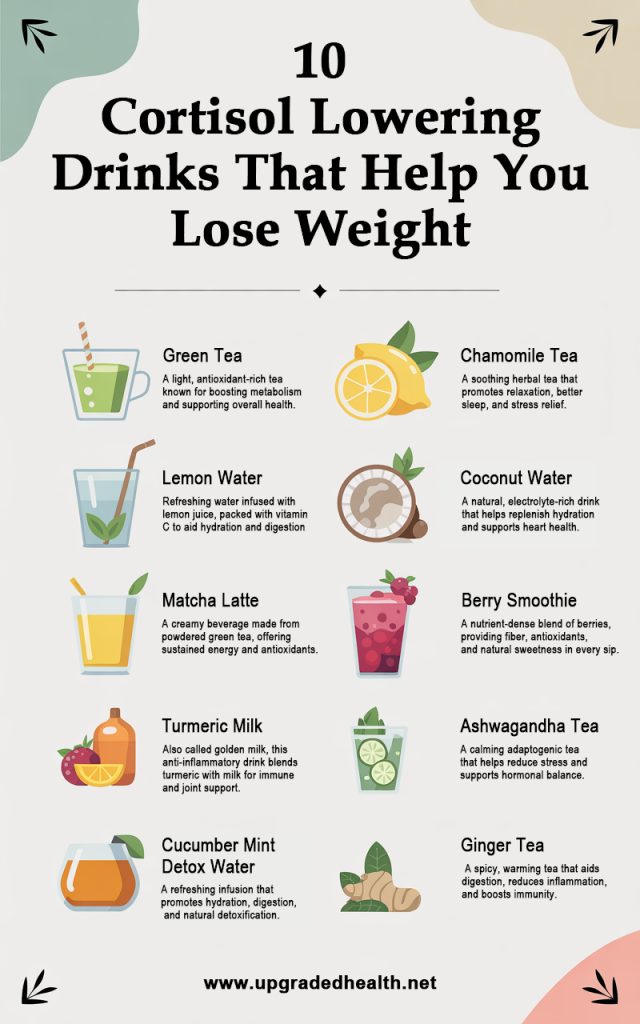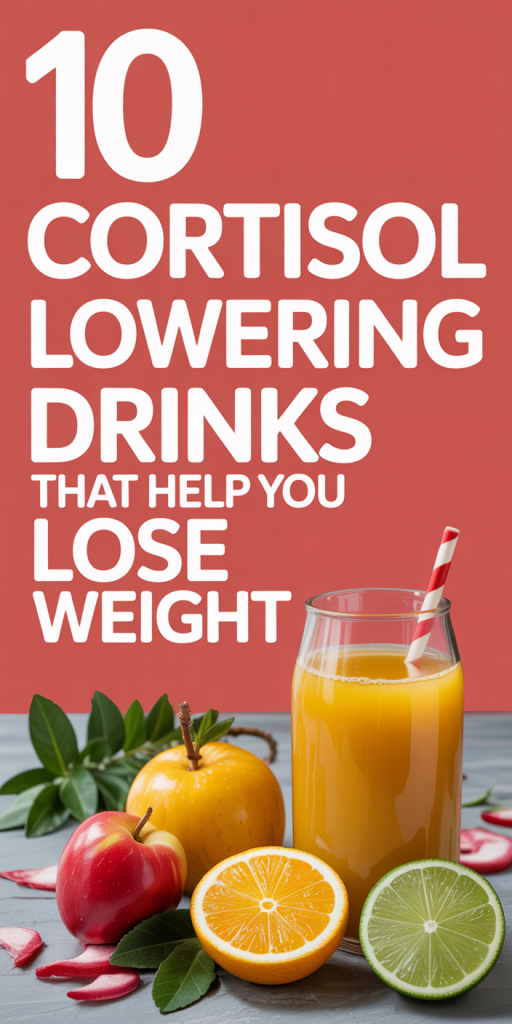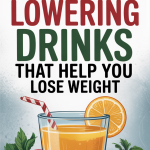10 Cortisol Lowering Drinks That Help You Lose Weight
In the modern world, stress has become an almost constant companion for many. While a little stress can be a good motivator, chronic stress can have a significant impact on our health, including our weight. One of the key players in this connection is cortisol, often referred to as the “stress hormone.” When cortisol levels are consistently high, it can lead to a cascade of physiological changes that promote weight gain, particularly around the abdominal area. This has led many to seek out natural ways to manage their cortisol levels, and surprisingly, what you drink can play a significant role.
This article explores the intricate relationship between cortisol and weight management, and then delves into ten specific beverages that have been shown to help lower cortisol levels. From ancient herbal teas to modern functional drinks, we will examine the science behind how these beverages can help you de-stress, rebalance your hormones, and support your weight loss journey. We will also touch on drinks to avoid and other lifestyle changes that can help you keep your cortisol in check. So, grab a calming cup of your favorite beverage and let’s dive into the world of cortisol-lowering drinks.
What is Cortisol and How Does It Affect Weight?
Cortisol is a steroid hormone that belongs to a class of hormones called glucocorticoids. It is produced in the adrenal glands, which are located on top of your kidneys. While it’s famously known as the “stress hormone” due to its role in the body’s stress response, cortisol has a wide range of important functions. It helps regulate blood sugar levels, reduce inflammation, suppress the immune system, and aid in the metabolism of fats, carbohydrates, and proteins [1].
Under normal circumstances, cortisol is released in a pattern that follows our natural sleep-wake cycle, known as the circadian rhythm. Levels are highest in the morning, shortly after waking up, to help us feel alert and energized, and they gradually decrease throughout the day, reaching their lowest point at night to allow for restful sleep. However, when we experience chronic stress—whether from work, personal life, or even lack of sleep—our bodies can get stuck in a state of high alert, leading to persistently elevated cortisol levels.
This is where the connection to weight gain comes in. When cortisol levels are chronically high, it can trigger a series of changes in the body that make it easier to gain weight and harder to lose it. Here’s how:
- Increased Appetite and Cravings: High cortisol levels have been shown to increase appetite, particularly for high-calorie, sugary, and fatty foods. This is because the body perceives stress as a threat and signals the need for more energy to deal with it. One study found a significant association between elevated cortisol levels and an increased appetite in women [2].
- Metabolism and Fat Storage: Cortisol can also influence where your body stores fat. It mobilizes triglycerides from storage and relocates them to visceral fat cells, which are the fat cells deep in the abdomen. This is why chronic stress is often linked to an increase in belly fat. In the presence of insulin, cortisol increases the activity of lipoprotein lipase, an enzyme that promotes fat accumulation in visceral adipose tissue [3].
- Insulin Resistance: Chronically high cortisol can lead to insulin resistance, a condition where the body’s cells don’t respond properly to insulin. This can lead to higher blood sugar levels and an increased risk of developing type 2 diabetes. Insulin resistance also makes it more difficult for the body to use glucose for energy, which can contribute to weight gain.
- Muscle Breakdown: Cortisol is a catabolic hormone, which means it can break down muscle tissue for energy. This can lead to a decrease in muscle mass, which in turn can slow down your metabolism and make it harder to lose weight.
In essence, while cortisol is a necessary and important hormone, when its levels are out of balance due to chronic stress, it can create a perfect storm for weight gain. This is why managing stress and lowering cortisol levels is a crucial component of any successful weight loss plan. The good news is that there are many natural ways to do this, including through the beverages we choose to consume.
10 Cortisol-Lowering Drinks to Help You Lose Weight
Now that we understand the connection between cortisol and weight gain, let’s explore some delicious and healthy beverages that can help you manage your stress hormone levels and support your weight loss goals. It’s important to note that while these drinks can be a helpful part of a healthy lifestyle, they are not a magic bullet. They should be consumed as part of a balanced diet and in conjunction with other stress-management techniques like exercise, mindfulness, and adequate sleep.
1. Green Tea
Green tea has been celebrated for its health benefits for centuries, and for good reason. It is packed with antioxidants, including a powerful compound called epigallocatechin-3-gallate (EGCG). Research has shown that EGCG can help lower cortisol levels by interrupting the activity of certain chemicals the body uses to produce it [4].
One study involving individuals with moderate stuttering found that drinking six cups of decaffeinated green tea daily for six weeks not only lowered their cortisol levels but also improved their overall mental health [5]. Another study found that tea consumption leads to lower post-stress cortisol and greater subjective relaxation [6].
In addition to its cortisol-lowering effects, green tea can also support weight loss in other ways. The catechins and caffeine in green tea are believed to increase energy metabolism, which may lead to weight loss [7].
To reap the benefits of green tea, aim for a few cups a day. You can enjoy it hot or iced, and there are many different varieties to choose from. If you are sensitive to caffeine, opt for decaffeinated green tea.

2. Ginseng Tea
Ginseng is another powerful adaptogenic herb that has been used in traditional medicine for centuries to help the body cope with stress. Adaptogens are substances that help the body adapt to physical and psychological stress, and ginseng is one of the most well-known. Research has shown that ginseng can help reduce cortisol levels and improve the body’s stress response.
One study found that four-week supplementation with ginseng reduced cortisol levels by 16% [8]. While this study used a supplement, drinking ginseng tea can still provide some of these benefits, although the concentration of the active compounds may be lower. More research is needed to determine the specific effects of ginseng tea on cortisol levels, but it is a promising area of study.
Ginseng tea can be made from the roots of either American or Asian ginseng. It has a slightly bitter, earthy flavor that can be balanced with a little honey or lemon. You can find ginseng tea bags at most health food stores, or you can make your own by steeping dried ginseng root in hot water.
3. Magnesium-Infused Drinks
Magnesium is an essential mineral that plays a crucial role in over 300 enzymatic reactions in the body, including those involved in stress regulation. It is often referred to as the “relaxation mineral” because of its ability to calm the nervous system and reduce anxiety. Research has shown that magnesium can help lower cortisol levels and reduce the body’s stress response.
One study found that magnesium supplementation can reduce the post-exercise cortisol spike [9]. Another study found that participants who took 350 mg of magnesium citrate complex for 24 weeks had lower levels of circulating cortisol [10].
While these studies used supplements, you can also get magnesium from your diet. Magnesium is found in a variety of foods, including leafy green vegetables, nuts, seeds, and whole grains. You can also find magnesium powders that can be mixed with water to create a magnesium-infused drink. This can be a convenient way to increase your magnesium intake and help manage your cortisol levels.
When choosing a magnesium supplement, look for a highly absorbable form like magnesium citrate, glycinate, or threonate. It is always a good idea to consult with a healthcare provider before starting any new supplement regimen.
4. Ashwagandha-Infused Drinks
Ashwagandha is another powerful adaptogenic herb that has been used in Ayurvedic medicine for thousands of years to promote longevity, vitality, and overall health. It is particularly well-known for its ability to help the body cope with stress and reduce cortisol levels. There is a growing body of scientific evidence to support these traditional uses.
Numerous studies have shown that ashwagandha supplementation can significantly reduce cortisol levels, as well as feelings of stress and anxiety [11]. One study found that adults who took 300 mg of ashwagandha root extract twice daily for 60 days had significantly lower cortisol levels and reported a significant reduction in stress levels compared to a placebo group. Another study found that doses of 240 to 1,250 mg per day of ashwagandha extract are effective in reducing cortisol [12].
Ashwagandha is available in various forms, including powders, tinctures, and capsules. You can easily create an ashwagandha-infused drink by mixing the powder into a smoothie, a glass of milk, or even just water. It has a slightly bitter, earthy flavor, so you may want to add a natural sweetener like honey or maple syrup.
When choosing an ashwagandha supplement, look for a high-quality extract that is standardized to contain a certain percentage of withanolides, the active compounds in ashwagandha. As with any supplement, it is best to consult with a healthcare provider before adding ashwagandha to your routine.
5. Yogurt-Based Drinks (Kefir)
Fermented dairy products like yogurt and kefir are not only delicious and versatile, but they may also help lower cortisol levels. This is due to their high content of probiotics, which are beneficial bacteria that live in our gut and play a crucial role in our overall health, including our mental health. The gut-brain axis is a complex communication network that connects the gut and the brain, and probiotics are thought to influence this connection.
Some evidence suggests that probiotics may help reduce cortisol levels, although more research is needed to confirm these findings [13]. In addition to their probiotic content, yogurt and kefir can also contain gamma-aminobutyric acid (GABA), a neurotransmitter that has a calming effect on the nervous system and can reduce anxiety and stress. GABA works by disrupting the production of cortisol in the adrenal glands, which can lead to lower levels of the hormone [14].
Kefir is a fermented milk drink that is similar to yogurt but has a thinner consistency. It is a particularly good source of probiotics, as it contains a wider variety of beneficial bacteria and yeast than yogurt. You can drink kefir on its own, or you can add it to smoothies or use it as a base for dressings and sauces.
When choosing a yogurt-based drink or kefir, look for a product that contains live and active cultures and is low in added sugar. You can also make your own kefir at home using kefir grains, which are available online or at health food stores.

6. Barley Juice
Barley juice, which is made from barley grass, is another beverage that may help lower cortisol levels. Like yogurt and kefir, barley juice is a natural source of GABA, the calming neurotransmitter that can help reduce stress and anxiety by disrupting cortisol production [15].
While there are no direct human studies that have looked at the link between barley juice and cortisol levels, it is a promising area for future research. Barley grass is also rich in vitamins, minerals, and antioxidants, which can support overall health and well-being.
Barley juice is typically sold as a powder that can be mixed with water or added to smoothies. It has a slightly sweet, grassy flavor. When choosing a barley grass powder, look for a high-quality product that is organic and has been cold-pressed to preserve its nutrients.
7. Orange Juice
Orange juice is a popular beverage that is well-known for its high vitamin C content. Vitamin C is a powerful antioxidant that plays a crucial role in immune function and overall health. Some research suggests that high doses of vitamin C may also help lower cortisol levels and promote faster recovery from stressful situations.
Studies on the effects of vitamin C on cortisol have used high doses, typically ranging from 1,000 to 3,000 mg per day [16]. To put this into perspective, one cup of orange juice contains about 124 mg of vitamin C [17]. This means you would have to drink a significant amount of orange juice—between 8 and 24 cups a day—to reach the doses used in these studies, which is not practical or healthy due to the high sugar content.
However, including orange juice in your diet in moderation can still contribute to your overall vitamin C intake and support your health in other ways. When choosing orange juice, opt for 100% pure orange juice with no added sugar, or better yet, make your own fresh-squeezed juice at home.
8. Coconut Water
Coconut water has become a popular beverage in recent years, and for good reason. It is a natural source of electrolytes, including potassium, which is important for maintaining fluid balance and proper muscle function. There is a connection between potassium and cortisol, as individuals with Cushing’s syndrome, a condition caused by exposure to high cortisol levels, often have low potassium levels (hypokalemia) [18].
However, it is important to note that for most healthy individuals, drinking coconut water is unlikely to have a direct impact on cortisol levels. While it can be a healthy and hydrating beverage, it should not be relied upon as a primary method for lowering cortisol.
That being said, coconut water can still be a beneficial addition to a healthy diet. It is a good alternative to sugary sports drinks, and it can help replenish electrolytes after a workout. When choosing coconut water, look for a product that is 100% pure and has no added sugar.
9. Chamomile Tea
Chamomile tea is a well-known herbal remedy for promoting relaxation and sleep. It has been used for centuries to calm the nerves and reduce anxiety. Research has shown that chamomile can be effective in treating the symptoms of high cortisol levels, and by treating the symptoms, the level of cortisol can decrease on its own [19].
One exploratory study found that increases in morning salivary cortisol and the diurnal cortisol slope are associated with symptom improvement in chamomile treatment of Generalized Anxiety Disorder (GAD) [20]. A systematic review also showed that oral intake of chamomile can help improve anxiety symptoms [21].
The calming effects of chamomile are thought to be due to its ability to reduce excitatory transmission in the brain and promote relaxation. The Cleveland Clinic recommends chamomile tea as a way to reduce stress [22].
Chamomile tea is widely available and can be enjoyed hot or cold. It has a mild, slightly sweet, and floral flavor. For a calming bedtime ritual, try sipping on a warm cup of chamomile tea before you go to sleep.
10. Lemon Balm Tea
Lemon balm is a member of the mint family and has a long history of use as a medicinal herb. It is known for its calming properties and is often used to reduce stress and anxiety. Research has shown that lemon balm can be effective in lowering cortisol levels and promoting a sense of calm.
Lemon balm contains compounds like rosmarinic acid and flavonoids, which are thought to be responsible for its anti-stress effects. One study found that all three active treatments with lemon balm were associated with reduced cortisol at one hour after administration [23]. Lemon balm works by inhibiting an enzyme called GABA-T, which breaks down GABA. This leads to an increase in the amount of GABA in the brain, which has a calming effect [24].
A 2024 research review suggests that lemon balm can help relieve stress and reduce cortisol levels [25]. Another study found that 300 mg of lemon balm in an iced tea drink resulted in significantly lower anxiety scores [26].
Lemon balm tea has a pleasant, lemony flavor and can be enjoyed hot or cold. It is a great option for a midday pick-me-up or a relaxing evening beverage.
Conclusion
Managing stress and cortisol levels is a crucial aspect of maintaining a healthy weight and overall well-being. While there is no magic potion for weight loss, incorporating cortisol-lowering drinks into your daily routine can be a simple and effective way to support your efforts. From the antioxidant-rich power of green tea to the calming properties of chamomile and lemon balm, the beverages we choose can have a real impact on our stress hormones.
It is important to remember that these drinks are most effective when combined with a healthy lifestyle that includes a balanced diet, regular exercise, adequate sleep, and other stress-management techniques. Also, be mindful of drinks that can raise cortisol levels, such as coffee, black tea, and sugary sodas, and consume them in moderation.
By making conscious choices about what we drink, we can take a proactive step towards a less-stressed, healthier, and happier life. So, the next time you feel overwhelmed, consider reaching for one of these calming and delicious beverages. Your body and mind will thank you for it.
References
- https://www.healthline.com/nutrition/cortisol-and-weight-gain
- https://pubmed.ncbi.nlm.nih.gov/27345309/
- https://pmc.ncbi.nlm.nih.gov/articles/PMC4461548/
- https://www.verywellhealth.com/drinks-to-lower-cortisol-11769512
- https://pmc.ncbi.nlm.nih.gov/articles/PMC5710842/
- https://pubmed.ncbi.nlm.nih.gov/17013636/
- https://pmc.ncbi.nlm.nih.gov/articles/PMC8406948/
- https://www.verywellhealth.com/drinks-to-lower-cortisol-11769512
- https://www.verywellhealth.com/drinks-to-lower-cortisol-11769512
- https://www.verywellhealth.com/drinks-to-lower-cortisol-11769512
- https://www.verywellhealth.com/drinks-to-lower-cortisol-11769512
- https://www.verywellhealth.com/drinks-to-lower-cortisol-11769512
- https://www.verywellhealth.com/drinks-to-lower-cortisol-11769512
- https://www.verywellhealth.com/drinks-to-lower-cortisol-11769512
- https://www.verywellhealth.com/drinks-to-lower-cortisol-11769512
- https://www.verywellhealth.com/drinks-to-lower-cortisol-11769512
- https://www.verywellhealth.com/drinks-to-lower-cortisol-11769512
- https://www.verywellhealth.com/drinks-to-lower-cortisol-11769512
- https://evinature.com/blog/health/the-benefits-of-chamomile-for-cortisol-levels/
- https://pmc.ncbi.nlm.nih.gov/articles/PMC5710842/
- https://pmc.ncbi.nlm.nih.gov/articles/PMC11109927/
- https://health.clevelandclinic.org/how-to-reduce-cortisol-and-turn-down-the-dial-on-stress
- https://pmc.ncbi.nlm.nih.gov/articles/PMC4245564/
- https://www.mariongluckclinic.com/blog/chilling-out-with-lemon-balm.html
- https://www.healthline.com/health/lemon-balm-for-weight-loss
- https://www.mdpi.com/2072-6643/16/20/3545





